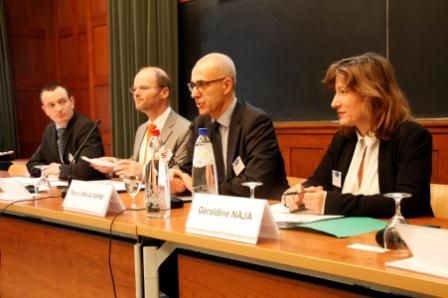
Research and innovation for cyber defence and combating cyber-crime is an issue that concerns the European Defence Agency (EDA), the European Commission, and the European Space Agency (ESA) alike. Many of the underlying technologies are the same for civil and military applications. Consequently, a certain degree of coordination between civil an defence research is needed. A joint workshop to shape the research and innovation agenda in the areas of cyber defence and the fight against cyber-crime and terrorism was therefore organised on 23 October in Brussels.
Marco Malacarne, acting director in the European Commission’s Directorate-General Enterprise and Industry, opened the workshop by giving an overview of his department’s achievements in cyber research. Michael Sieber, responsible for cyber research in the European Defence Agency, listed typical defence characteristics for research in the domain, while Géraldine Naja of the European Space Agency explained that the EU’s growing number of space assets needed to be protected. She continued that satellites had been subject to cyber-attacks in the past and that the protection of ground segments should be enhanced as well. A coordinated action at EU level would be most effective to that end. Europol’s concern in the cyber domain lies more in the area of online criminal behaviour as companies attempt to gain a competitive edge and enhance their market share by stealing information online.
Academics pointed to a set of research issues for the cloud, ubiquitous computing and the future internet. Professor Van Eeten from Delft University explained how his research showed that internet service providers needed to be given incentives to improve online security. ‘Effortless security’ was the issue raised by Professor Paar, University of Bochum, who listed obfuscation and reverse engineering as a field where more research needed to be done. Federated military networks are the area of research of Dr Aurisch in his German Fraunhofer Institute; while Professor Nieto Taladriz from Madrid showed the results of research in the area of reputation and anomaly detection for securing distributed networks. Cryptography is another part of the overall online security puzzle. Crypto research in Europe is proven to be top-of-the-world, with EU research outfits winning awards in U.S competitions. However, the EU lacks a European cryptography policy . Such a policy, Professor Preneel from KU Leuven argued, could push crypto research to the next level.
Managing threats and vulnerabilities, visualisation techniques and self-repair based on biology research were all issues covered. Feedback from the audience showed that cyber security and cyber defence research in Europe is in a good shape. There is a need for communication and exchange of results between the different research communities and across Europe. More exchange in the sort of workshop organised by EDA, ESA and the European Commission will help to avoid duplication and to connect different bits of research. Topical workshops will follow on the issues raised; the ideas generated in the workshop will feed into the research agenda of each institution.